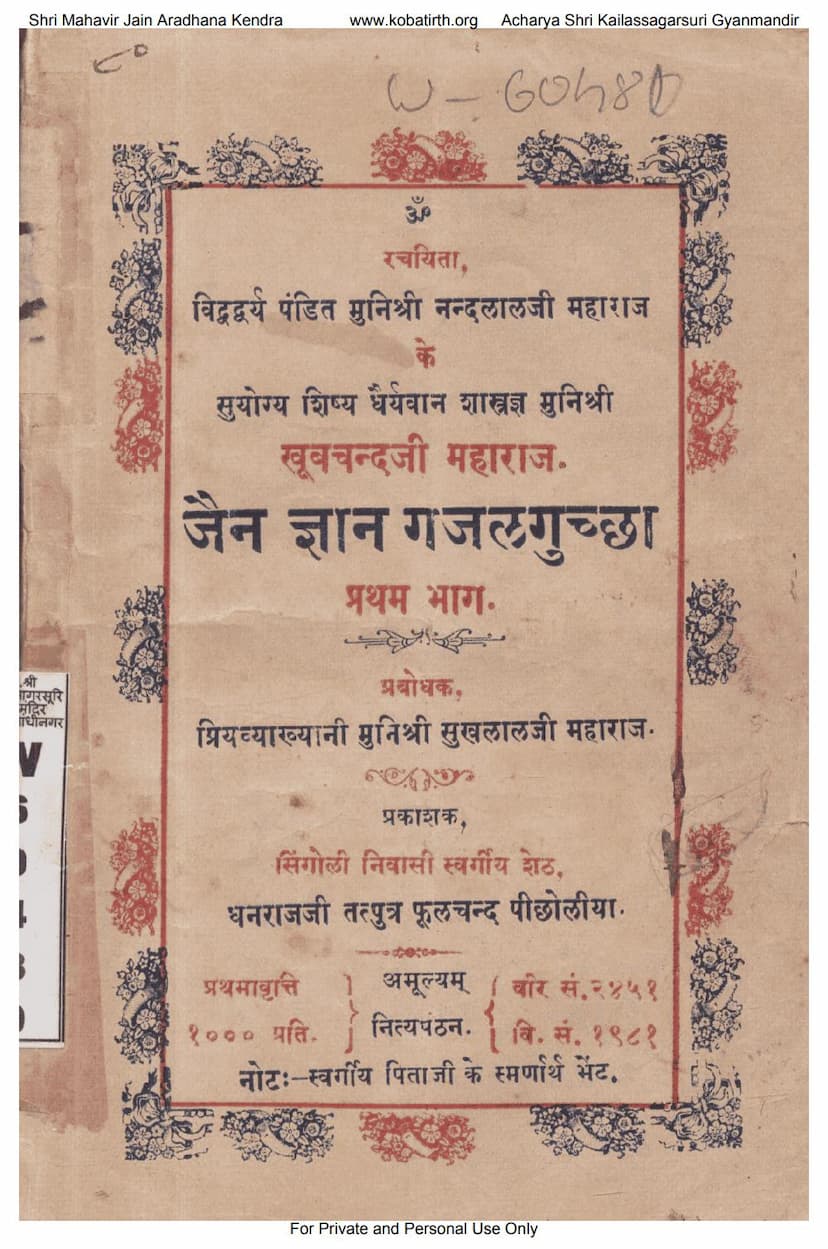Jain Gyan Gajal Guccha
Added to library: September 2, 2025

Summary
Here is a comprehensive summary of the Jain text "Jain Gyan Gajal Guccha, Pratham Bhag" by Khubchandji Maharaj:
Overview and Purpose:
"Jain Gyan Gajal Guccha, Pratham Bhag" is a collection of devotional songs (Gajals) written in Gujarati, composed by Muni Shri Khubchandji Maharaj. The book's primary purpose, as stated in the preface, is to provide spiritual and moral guidance, especially to the younger generation, by offering edifying content in a melodious and engaging format (Gajals). The author and publisher recognized a trend of youth being drawn to popular, sometimes morally questionable, Ghazals and aimed to counter this by presenting Jain teachings through a similar, appealing style. The book is dedicated to propagating Jain principles of righteousness, non-violence, and spiritual upliftment.
Author and Lineage:
The author, Muni Shri Khubchandji Maharaj, is a devoted and knowledgeable disciple of Muni Shri Nandlalji Maharaj, who himself was a prominent scholar and exponent of Jain scriptures. This lineage emphasizes the tradition of scholarly teaching and spiritual practice within the Jain tradition. The book is presented as a tribute to his Guru, Muni Shri Nandlalji Maharaj.
Content and Themes:
The collection features 28 Ghazals, each focusing on a distinct aspect of Jain philosophy, ethics, and conduct. The themes covered are comprehensive and address essential elements of a spiritual life, including:
- Devotion to Tirthankaras: The book begins with devotional verses praising Lord Mahavir, the 24th Tirthankara, and emphasizes the recognition of pure deities (Arhants and Siddhas) as the true objects of worship.
- Guidance on Righteous Living: Many Ghazals offer guidance on essential aspects of daily life and spiritual practice:
- Identifying True Gurus: Ghazals describe the qualities of an ideal Jain monk (Suguru) who embodies self-control, equanimity, and detachment.
- Moral Teachings: The core of the collection lies in Ghazals that discourage vices and promote virtues, addressing:
- Anger (Krodh): Warning against the destructive nature of anger.
- Pride/Ego (Maan): Highlighting how pride leads to downfall and disrespect.
- Deceit/Dishonesty (Kapat): Advocating for truthfulness and integrity in all dealings.
- Greed (Lobh): Emphasizing contentment over excessive desire as the root of many sins.
- Violence (Hinsa): Stressing the importance of compassion and refraining from harming living beings.
- Lying (Jhooth): Explaining the negative consequences of falsehood.
- Stealing (Chori): Condemning theft and its repercussions.
- Adultery/Improper Conduct (Parstrī Gaman): Promoting chastity and fidelity.
- Attachment to Possessions (Parigrah): Advising detachment from material wealth, as it is ultimately impermanent.
- Intoxication (Nashā): Warning against the detrimental effects of intoxicants.
- Backbiting/Slander (Paranindā): Discouraging the act of speaking ill of others.
- Positive Virtues and Practices:
- Good Company (Satsang): Highlighting the benefits of associating with virtuous individuals for spiritual growth.
- Discipleship (Sushishya): Describing the qualities of an ideal disciple who obeys their guru.
- Generosity and Charity (Daan): Encouraging the practice of giving, especially to deserving individuals.
- Truth (Satyadharma): Defining true Dharma as adherence to principles like non-violence, truthfulness, non-stealing, celibacy, and non-possession.
- Awareness of Mortality (Alpayu): Reminding readers of the fleeting nature of life and the importance of using time wisely for spiritual pursuits.
- Beneficial Actions (Hitopadesh): Offering general advice for living a meaningful life.
- Qualities of a Lay Follower (Shravak): Outlining the duties and virtues expected of a Jain householder.
- Qualities of a Virtuous Wife (Patita): Describing the ideal conduct of a devoted wife.
- Overcoming Envy (Īrshā): Advising against jealousy and encouraging contentment.
- Avoiding Bad Company (Kusamp): Warning against the negative influence of unrighteous associations.
- Spiritual Awakening (Satbodh): Encouraging self-reflection and the pursuit of liberation.
- Guru's Significance: The book consistently emphasizes the pivotal role of the Guru (Muni Shri Nandlalji Maharaj) in guiding individuals towards spiritual enlightenment and liberation. The author expresses deep reverence for his Guru throughout the collection.
Structure and Style:
The book is structured as a series of Ghazals, each with a distinct theme and a consistent meter and rhyme scheme. The language is Gujarati, aiming for simplicity and accessibility to convey profound spiritual concepts in an easily understandable and memorable way. The repetitive refrain within each Ghazal ("meri tujhe malum nahi," "tera tujhe malum nahi," "tu samjh le achi tarah," etc.) reinforces the message and makes it impactful.
Publication Details:
- Author: Muni Shri Khubchandji Maharaj
- Publisher: Fulchand Dhanraj Picholiya (a donation from Seth Dhanrajji's son, Phoolchand Picholiya, in memory of his father)
- First Edition: Published in Veer Samvat 2451 (1981 AD), with a print run of 1000 copies.
- Location: The publisher is from Singoli. The preface also mentions "Shri Mahavir Jain Aradhana Kendra, www.kobatirth.org, Acharya Shri Kailassagarsuri Gyanmandir" as associated institutions.
In essence, "Jain Gyan Gajal Guccha, Pratham Bhag" is a guide to righteous living and spiritual advancement, presented through the beautiful and accessible medium of Ghazals. It serves as a testament to the teachings of Jainism and the profound influence of spiritual gurus in illuminating the path to salvation.